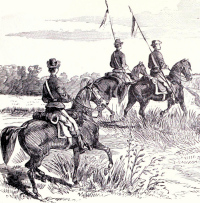THE narrative1 we propose to give of events in Missouri is not intended to be a defence of General Fremont, nor in any respect an answer to the charges which have been made against him. Our purpose is the more humble one of presenting a hasty sketch of the expedition to Springfield, confining ourselves almost entirely to the incidents which came under the observation of an officer of the General’s staff.
General Fremont was in command of the Western Department precisely One Hundred Days. He assumed the command at the time when the army with which Lyon had captured Camp Jackson and won the Battle of Booneville was on the point of dissolution. The enemy, knowing that the term for which our soldiers had been enlisted was near its close, began offensive movements along their whole line. Cairo, Bird’s Point, Ironton, and Springfield were simultaneously threatened. Jeff Thompson wrote to his friends in St. Louis, promising to be in that city in a month. The sad, but glorious day upon Wilson’s Creek defeated the Rebel designs, and compelled McCulloch, Pillow, Hardee, and Thompson to retire.
Relieved from immediate danger, General Fremont found an opportunity to organize the expedition down the Mississippi. Won by the magic of his name and the ceaseless energy of his action, the hardy youth of the Northwest flocked into St. Louis, eager to share his labors and his glory. There was little time for organization and discipline. They were armed with such weapons as could be procured against the competition of the General Government, and at once forwarded to the exposed points. History can furnish few parallels to the hasty levy and organization of the Army of the West. When suddenly required to defend Washington, the Government was able to summon the equipped and disciplined militia of the East, and could call upon the inexhaustible resources of a wealthy and skilful people. But in the West there was neither a disciplined militia nor trained mechanics. Men, indeed, brave, earnest, patriotic men, were plenty, –men who appreciated the magnitude and importance of the task before them, and who were confident of their ability to accomplish it. But to introduce order into their tumultuous ranks, to place arms in their eager hands, to clothe and feed them, to provide them with transportation and equipage for the march, and inspire them with confidence for the siege and the battle, –this labor the General, almost unaided, was called upon to perform. Like all the rest of our generals, he was without experience in military affairs of such magnitude and urgency, and he was compelled to rely chiefly upon the assistance of men entirely without military training and knowledge. The general staff and the division and brigade staffs were, from the necessity of the case, made up mainly of civilians. A small number of foreign officers brought to his aid their learning and experience, and a still smaller number of West Point officers gave him their invaluable assistance. In spite of all difficulties the work proceeded. In six weeks the strategic positions were placed in a state of defence, and an army of sixty thousand men, with a greater than common proportion of cavalry and artillery, stood ready to clear Missouri of the invader and to open the valley of the Mississippi. At this time the sudden appearance of Price in the West, and the fall of Lexington, compelled the General to take the field. We will now confine ourselves to the narrative of the incidents of the march to Springfield, as it is given in the journal which has been placed in our hands.
